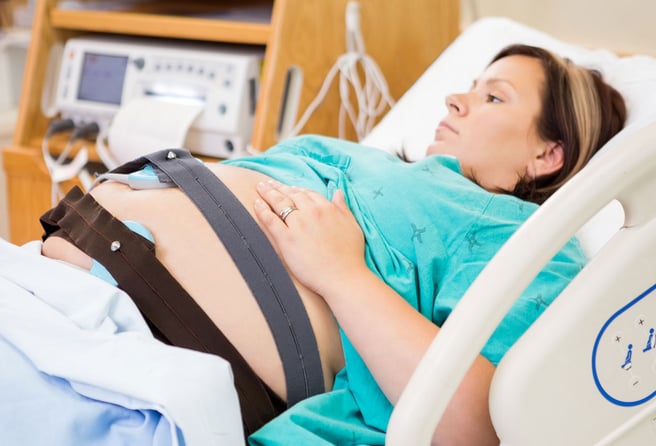
During childbirth, a woman can run a gamut of emotions from happy and joyful to sad and fearful. Like most medical procedures, labor and delivery can vary patient by patient while also varying pregnancy by pregnancy for the same woman.
There are many variables that factor into a woman's decision as to whether her birth experience was a positive or negative one. Studies have used a variety of methods to identify those factors which create a positive birthing experience, however, with each new study, those factors become less consistent.
What factors influence a woman's perception of her birthing experience?
Generally, the studies have suggested that a positive perception of childbirth, including satisfaction with the experience and care is associated with by greater maternal age, prenatal education, shorter labor, a home-like birth environment, a vaginal birth, fewer interventions such as inductions, forceps/vacuum extraction, and episiotomies, decreased maternal stress and anxiety, and participation in decision making just to name a few.
One study suggested that a negative birth experience is prevalent in roughly 7-34% of all births and that this may lead to a decrease in a woman’s self-esteem, a feeling of disempowerment, and mental health problems. These mental health issues could potentially lead to postpartum depression and/or anxiety.
 During postpartum depression a woman may experience a myriad of symptoms. Some include severe mood swings, withdrawal from family and friends, severe anxiety and/or panic attacks, and even thoughts of harming themselves or their baby. One of the risk factors for developing postpartum depression is experiencing a stressful event, including childbirth complications.
During postpartum depression a woman may experience a myriad of symptoms. Some include severe mood swings, withdrawal from family and friends, severe anxiety and/or panic attacks, and even thoughts of harming themselves or their baby. One of the risk factors for developing postpartum depression is experiencing a stressful event, including childbirth complications.
Taking steps to improve the overall labor and delivery experience
Some hospitals and birthing facilities are taking steps to improve the overall labor and delivery experience such as:
- Ensuring a patient has adequate support either through a doula or other support person who can not only support the patient but her partner as well.
- Making sure communication is open throughout the entire process, including addressing any fears or concerns a woman may have.
- Being able to adjust the room’s atmosphere for each patient, such as turning off the lights, allowing the patient to bring music, or the use of essential oils to create a feeling of calm.
While the use of aromatherapy is accepted in most birthing centers, allowing the patient to bring their own diffusers can be risky. One article shares that the use of diffusers may put patients at risk for waterborne infections with pathogens.
How Elequil Aromatabs can help comfort patients in labor and delivery
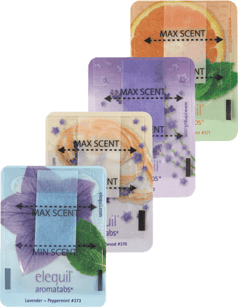 Many birthing centers are offering their patients aromatherapy by providing Elequil Aromatabs®, aromatherapy designed for the clinical setting. Each Elequil aromatab is made with 100% essential oils and adheres to the patient’s gown/clothing so that the aroma stays within their personal space.
Many birthing centers are offering their patients aromatherapy by providing Elequil Aromatabs®, aromatherapy designed for the clinical setting. Each Elequil aromatab is made with 100% essential oils and adheres to the patient’s gown/clothing so that the aroma stays within their personal space.
There are four aromas that Elequil Aromatabs offer to comfort the patient based on their needs. The aromas include essential oils such as lavender and sandalwood which promote relaxation during pain and can help comfort and calm anxiousness; orange which helps to uplift, and peppermint which can help soothe queasiness.
New mothers speak out about clinical aromatherapy during childbirth
In November 2021, a blind, random, anonymous survey was administered to explore the emotions women felt while in labor and giving birth. A total of 512 women participated, ranging in age from 25 to 45 living in the United States.
The emotions that most women reported feeling at some point during labor where nervous (76%), anxious (62%), excited (60%), happy (50%), overwhelmed (44%), scared (42%), and fearful (39%). Patients noted how they felt multiple emotions throughout the course of their experience. “Birthing a child made me have a rush of different emotions” one woman said.
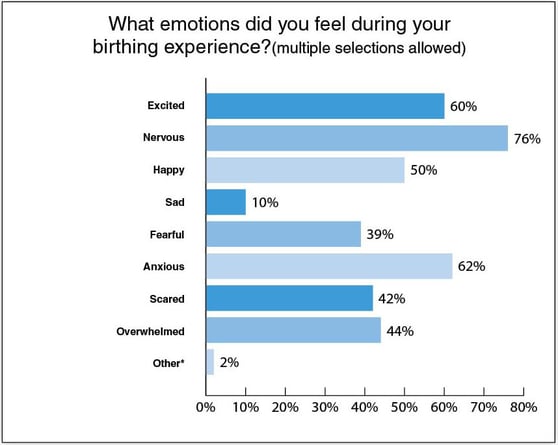
A small gesture that can influence a new mom to return for future care
The survey also asked patients questions regarding the use of aromatherapy during labor and delivery.
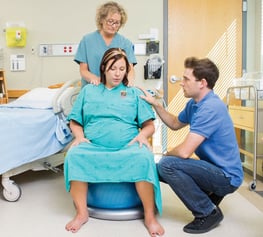 Approximately 8% of survey respondents said they were offered Elequil Aromatabs. Of those, 79% said that since Elequil Aromatabs were offered to them, it is an influence on their decision to return to the hospital in which they gave birth.
Approximately 8% of survey respondents said they were offered Elequil Aromatabs. Of those, 79% said that since Elequil Aromatabs were offered to them, it is an influence on their decision to return to the hospital in which they gave birth.
One patient shared a part of her birthing experience, relaying that she had a C-section and was scared during the surgery. The hospital offered her Elequil Aromatabs despite her never using aromatherapy before and she said they made her feel more at ease.
Another woman reported feeling nervous, anxious, overwhelmed, and afraid because she was told that giving birth is very painful. “Using Elequil Aromatabs helped me calm down while I was feeling pain and anxiousness. Because this facility offered Elequil Aromatabs, I would be more likely to return.”
Of the the women who were not offered Elequil Aromatabs during their labor and delivery experience, 70% responded that they would have liked to have had it be offered to them based on the description that it promotes relaxation during pain, calms anxiousness, and soothes queasiness.
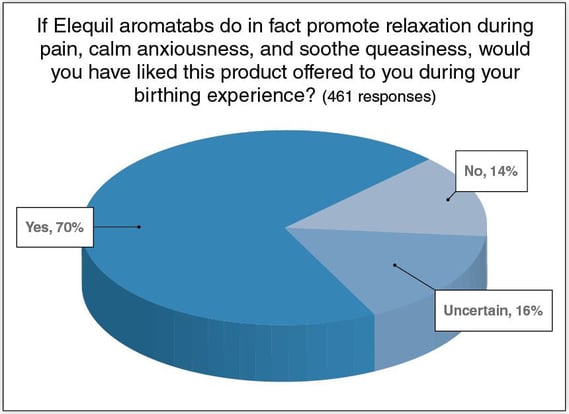
Learn more
To learn more about Elequil Aromatabs and the benefits of clinical aromatherapy in labor and delivery, contact Beekley Medical at 1.800.233.5539 or email info@beekley.com and ask about our trial evaluation program.

Megan Sargalski
Marketing Communications Specialist
